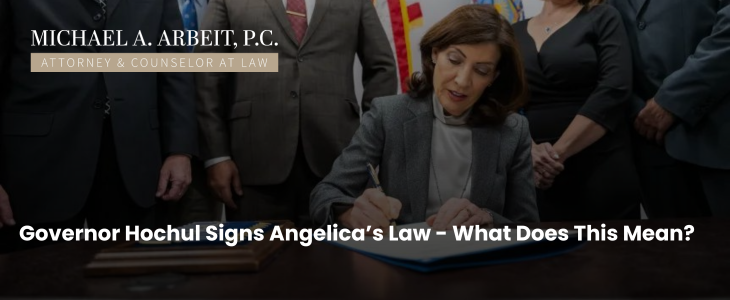Angelica’s Law, which passed in the New York State Senate in June 2023 after a 15-year effort, was signed by Governor Kathy Hochul just this past December. The legislation titled “Angelica’s Law” (S.4671/A.3983) protects New Yorkers by making it a felony to drive with five or more license suspensions. It was named for Angelica Nappi, who was killed back in 2008 at the age of 14 when a driver with seven suspensions ran a red light. Angelica’s mom was the advocate who urged lawmakers to pass a law that made driving with five suspensions a felony instead of ten, which is what was on the books.
Angelica’s Law will help to keep drivers with prior suspensions off of the road. Drivers will be charged with a felony if they are operating a vehicle without a valid license after having committed five or more moving violations resulting in prior suspension or revocations. Angelica’s Law represents a significant step in enhancing road safety and holding reckless drivers accountable.
Key Aspects Of Angelica’s Law
Here are the key aspects of Angelica’s Law:
- Purpose and Impetus: Angelica’s Law aims to protect New Yorkers from dangerous and reckless driving. Besides being pushed for over a decade by Dawn Nappi, Angelica’s mother, who sought to transform her pain into legislative change, it was in response to the alarming rise in fatal crashes in general, particularly in Long Island.
- Legal Amendments: The law amends New York’s vehicle and traffic laws, specifically concerning the offense of first-degree aggravated unlicensed operation (AUO) of a motor vehicle. It is designed to tighten the rules against drivers who operate vehicles without a valid license and have a history of traffic violations.
- Reduction in Suspension Thresholds: One of the key features of Angelica’s Law is the reduction in the number of prior license suspensions required to qualify for a first-degree AUO offense. Previously, more suspensions were needed for such an offense to be considered a felony. The law aims to keep drivers with multiple suspensions off the road by applying stricter legal consequences earlier in their history of violations.
- Enhanced Penalties: The law imposes felony charges on recidivist drivers — meaning those who repeatedly violate traffic laws. It applies particularly to those who continue to drive after committing five or more moving violations leading to license suspensions or revocations. This change sends a strong message to habitual offenders about the severe consequences of their actions.
- Focus on Highway Safety: Angelica’s Law is part of New York’s broader goal to improve highway safety. By targeting unlicensed drivers, the law seeks to provide a meaningful deterrent against the unauthorized operation of motor vehicles. This is especially crucial given the dangers posed by unlicensed drivers on public highways, as highlighted by the tragic case of Angelica Nappi.
In conclusion, Angelica’s Law addresses a critical public safety issue by imposing stricter penalties on habitual traffic offenders and reducing the threshold for felony charges related to unlicensed driving. This legislation reflects New York’s commitment to preventing tragedies caused by reckless and dangerous driving and enhancing road safety in general.
If you find yourself in criminal trouble due to this new law, you must contact an experienced criminal law attorney in Long Island or throughout the New York Metropolitan area who can powerfully assist you with your defense. Contact Michael A. Arbeit, PC, to help ensure that your rights are protected and you are afforded a proper defense should you need it.

